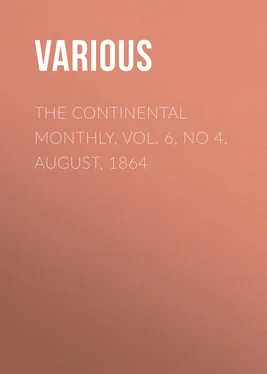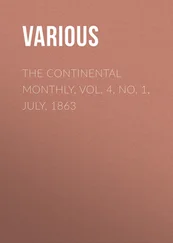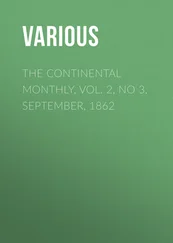Various - The Continental Monthly, Vol. 6, No 4, August, 1864
Здесь есть возможность читать онлайн «Various - The Continental Monthly, Vol. 6, No 4, August, 1864» — ознакомительный отрывок электронной книги совершенно бесплатно, а после прочтения отрывка купить полную версию. В некоторых случаях можно слушать аудио, скачать через торрент в формате fb2 и присутствует краткое содержание. Жанр: foreign_antique, periodic, Языкознание, Политика, foreign_edu, на английском языке. Описание произведения, (предисловие) а так же отзывы посетителей доступны на портале библиотеки ЛибКат.
- Название:The Continental Monthly, Vol. 6, No 4, August, 1864
- Автор:
- Жанр:
- Год:неизвестен
- ISBN:нет данных
- Рейтинг книги:4 / 5. Голосов: 1
-
Избранное:Добавить в избранное
- Отзывы:
-
Ваша оценка:
- 80
- 1
- 2
- 3
- 4
- 5
The Continental Monthly, Vol. 6, No 4, August, 1864: краткое содержание, описание и аннотация
Предлагаем к чтению аннотацию, описание, краткое содержание или предисловие (зависит от того, что написал сам автор книги «The Continental Monthly, Vol. 6, No 4, August, 1864»). Если вы не нашли необходимую информацию о книге — напишите в комментариях, мы постараемся отыскать её.
The Continental Monthly, Vol. 6, No 4, August, 1864 — читать онлайн ознакомительный отрывок
Ниже представлен текст книги, разбитый по страницам. Система сохранения места последней прочитанной страницы, позволяет с удобством читать онлайн бесплатно книгу «The Continental Monthly, Vol. 6, No 4, August, 1864», без необходимости каждый раз заново искать на чём Вы остановились. Поставьте закладку, и сможете в любой момент перейти на страницу, на которой закончили чтение.
Интервал:
Закладка:
We will think more of each other also for all this. We will love and honor each other better. Under the awful pressure of the Hand that lies upon us so heavily, we are brought into closer knowledge and closer sympathy. The blows of battle are welding us into one. Fragments of all people, and all races, cast here by the waves, and strangers to each other, with a hundred repulsions and separations, even to language, religions, and morals, the furnace heat of our trial is fusing all parts into one strong, united whole. We are driven and drawn together by the sore need that is upon us, and as Americans are forgetting all else. The civil war is making us a people —the American People. We are no longer 'the loose sweepings of all lands,' as they called us. We are one, now, brethren all in the sacrament of a great sorrow.
And is this nothing?
And these goods and gains are permanent. They do not belong to this generation only, or to this time exclusively. After all, the nation is mainly an educator. These things remain, as parts of its moral influence in moulding and training. And here is their infinite value. Independence, courage, patience, fortitude, nobleness, self-sacrifice, and tenderness become the national ethics. These things are pressed home on all growing minds. Coming generations are to be educated in these, by the example of the present. We are stamping these things, as the essentials of the national character, on the ages to come.
A thousand years of prosperity will have no power of this kind. What is there in Chinese history to elevate a Chinaman? What high, heroic experience to educate him, in her long centuries of ignoble peace? The training power of a nation is acquired always in the crises of its history. In the day when it rises to fight for its life, the typal men, who give it the lasting models of its excellence, spring forth too for recognition. The examples of these days of our own crisis will remain forever to influence the children of our people. We may be thankful, in our deepest sorrow, that we are leaving them no example of cowardice or meanness, that we give them a record to read of the courage, endurance, and manliness of the men that begat them, that the stamp of national character we leave to teach them is one of which a brave, free people need never be ashamed, that, in the troubles they may be called to face, we leave them, as the national and tried cure for all troubles, the bold, true heart, the willing hand, the strong arm, and faith in the Lord of Hosts. Shiloh, Stone River, Gettysburg, and the Wilderness, and a hundred others, are the heroic names that will educate our grandchildren, as Bunker Hill, Yorktown, and Saratoga have educated ourselves. Who will say that a heritage of heroism and truth and loyalty like this, to leave to the land we love, is nothing? Who can count the price that will sum its value?
Here, at least, are some of the gains of our civil war. We seek not to penetrate the councils of the Omniscient, or guess His purposes, though we may humbly hope there are vaster things than these in store for humanity and the world as the results of the struggle. Believing that He governs still, that He reigns on the James, as He reigned on the Jordan, that He decides the end, and not President Lincoln or Jefferson Davis, and not General Grant or General Lee, we have firm faith that this awful struggle is no brute fight of beasts or ruffians, but a grand world's war of heroes. We believe He will justify His government in the end, and make this struggle praise Him, in the blessed days that are to come. But we leave all those dim results unguessed at, as we leave the purposes of the war itself unmentioned, and the ends which justify us in fighting on. Men, by this time, have made up their minds, once for all, on these last points. The nation has chosen, and in its own conscience, let others think as they may, accepts the responsibility cheerfully.
It is enough to indicate, as we have done, some real , though immaterial, results already attained, results which, to the philosopher or thoughtful statesman, are worth a very large outlay. They do not, indeed, remove the horror of war, they do not ask us not to seek peace, they do not dry the tears, or hide the blood of the contest, but they do show us that war is no unmixed evil, that even honest, faithful war-work is acceptable work, and will be paid for.
They declare that, after all, war is a means of moral training, that 'Carnage' may be, as the gentlest of poets wrote, 'God's daughter,' that battles may be blessings to be thankful for in the long march of time. They bring to our consciousness, once more, the fact that a Great Battle, amid all its horror, wrath, and blood, is something sacred still, an earthly shadow of that Unseen Battle which has stormed through time, between the hosts of Light and Darkness. They declare again, to the nation, that old truth, without which the nation perishes and man rots, that to die in some good cause is the noblest thing a man can do on earth. They bid us bend in hope beneath the awful hand of the God of Battles, and do our appointed work patiently, bravely, loyally, till He brings the end. They tell us that not work only, but heroic fighting, also, is a worship accepted at His seat. They bid us be thankful, as for the most sacred of all gifts, that thousands, in this loyal land of ours, have had the high grace, given from above,
'To search through all they felt and saw,
The springs of life, the depths of awe,
And reach the law within the law :
'To pass, when Life her light withdraws,
Not void of righteous self-applause,
Nor in a merely selfish cause—
'In some good cause, not in their own,
To perish, wept for , honored , known ,
And like a warrior overthrown.'
PROVERBS
Violets and lilies-of-the-valley are seen in a vale.
Family jars should be filled with honey.
All are not lambs that gambol on the green.
Ask the 'whys,' and be wise.
THE UNDIVINE COMEDY—A POLISH DRAMA
PART II
'Du Gemisch von Koth und Feuer!'
'Thou compound of clay and fire!'
Why, O child! art thou not, like other children, riding gayly about on sticks for horses, playing with toys, torturing flies, or impaling butterflies on pins, that the brilliant circles of their dying pangs may amuse thy young soul? Why dost thou never romp and sport upon the grassy turf, pilfer sugarplums and sweetmeats, and wet the letters of thy picture book from A to Z with sudden tears?
Infant king of flies, moths, and grasshoppers; of cowslips, daisies, and of kingcups; of tops, hoops, and kites; little friend of Punch and puppets; robber of birds' nests, and outlaw of petty mischiefs—son of the poet, tell me, why art thou so unlike a child—so like an angel?
What strange meaning lies in the blue depths of thy dreamy eyes? Why do they seek the ground as if weighed down by the shadows of their drooping lashes; and why is their latent fire so gloomed by mournful memories, although they have only watched the early violets of a few springs? Why sinks thy broad head heavily down upon thy tiny hands, while thy pallid temples bend under the weight of thine infant thoughts, like snowdrops burdened with the dew of night?
And when thy pale cheek floods with sudden crimson, and, tossing back thy golden curls, thou gazest sadly into the depths of the sky—tell me, infant, what seest thou there, and with whom holdest thou communion? For then the light and subtile wrinkles weave their living mesh across thy spotless brow, like silken threads untwining by an unseen power from viewless coils, and thine eyes sparkle, freighted with mystic meanings, which none are able to interpret! Then thy grandam calls in vain, 'George, George!' and weeps, for thou heedest her not, and she fears thou dost not love her! Friends and relations then appeal to thee in vain, for thou seemest not to hear or know them! Thy father is silent and looks sad; tears fill his anxious eyes, falling coldly back into his troubled heart.
Читать дальшеИнтервал:
Закладка:
Похожие книги на «The Continental Monthly, Vol. 6, No 4, August, 1864»
Представляем Вашему вниманию похожие книги на «The Continental Monthly, Vol. 6, No 4, August, 1864» списком для выбора. Мы отобрали схожую по названию и смыслу литературу в надежде предоставить читателям больше вариантов отыскать новые, интересные, ещё непрочитанные произведения.
Обсуждение, отзывы о книге «The Continental Monthly, Vol. 6, No 4, August, 1864» и просто собственные мнения читателей. Оставьте ваши комментарии, напишите, что Вы думаете о произведении, его смысле или главных героях. Укажите что конкретно понравилось, а что нет, и почему Вы так считаете.












